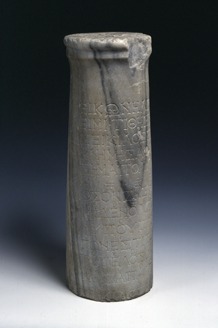11.1: Vocal Music in Ancient Greece
- Page ID
- 169114
Vocal Music in Ancient Greece.
From Ancient Antiquity through the Renaissance, vocal music was the preferred type of music by scholars and philosophers. The majority of music that was written and orally transmuted among the centuries was written specifically to be sung. This doesn't mean that instruments didn't exist throughout this time, but that sung music was preferred. And of course, the human voice singing necessitates text: words that are sung by an individual, or a group of individuals singing as a unit.
The Ancient Greeks had a word for the mystical power that music had on transmuting and even manipulating human emotions: ethos. Words attached to melodies, they believed, have the power to move people, and even rulers of nations. The philosopher Plato wrote about how important vocal music was, arguing that music should be attached to poetry to reach its true value. Arguing that music in society should serve the state, he warned against the use of purely instrumental music, saying that it had little value!
Plato's student Aristotle believed that music could imitate and affect human character, writing:
“[melodies] contain in themselves imitation of ethoses; and this is manifest, for even in the nature of the harmoniai there are differences, so that people when hearing them are affected differently and have not the same feelings in regard to each of them, but listen to some in more mournful and restrained state…the same holds good about the rhythms also, for some have a more stable and other a more emotional ethos, and of the latter some are more vulgar in their emotional effects and others more liberal.” [Aristotle, Politics 8.5, quoted from Burkholder, A History of Western Music, 9th edition pg. 14)
Clearly, these philosophers felt that music had a mystical power to move and change human emotions. To this day, there are many writings about music that have survived, and there are even many mosaics, and sculptures that depict people playing music. Unfortunately, not much manuscript—that is, written music—has survived to this day. Much of the music was transmitted orally, and not written down. About 45 pieces or fragments of Ancient Greek music survives today, ranging from the 5th century BC to the 4th century AD.
In Ancient Greece, music served many different purposes, like today. There were hymns (sacred music sung to a god), funeral songs, wedding songs—even Epic Poetry (the Odyssey) was set to music. And while not much music has survived, the music that has survived is mostly monophonic -- that is, it consists of a single melodic line without any accompaniment. We are not sure if this is how music was actually performed, as many pictures depict instruments being played while others sang. However, we do not know how the instrumental music interacted with the performers.
Song of Seikilos

The oldest surviving complete piece of music is titled the 'Song of Seikilos,' and epitaph, a short, poignant/humorous poem that typically is inscribed on tombstones. It was discovered in southern Turkey, and it's from approximately the 1st century AD. What's truly remarkable is that there seems to be actual musical notation inscribed over the Greek text!
The poem translates to English as follows:
"As long as you live,
be lighthearted.
Let nothing trouble you.
Life is only too short,
and time takes its toll."
Take a listen to this performance of the Song of Seikilos and you'll hear a stringed instrument that doesn't sound like what we're used it. This is a Kithara, which is an ancient Greek stringed instrument. It will likely sound distant and foreign to your 21st century ear. When you're done listening to this song, watch the video presentation on this unit, and you'll learn more about what makes this piece sound so unique.
(left): Seikilos' tombstone. CC BY-SA 3.0.
For those interested in downloading the handouts of the PDFs for this unit, click here for early vocal music and here for later vocal music.

